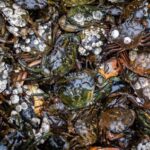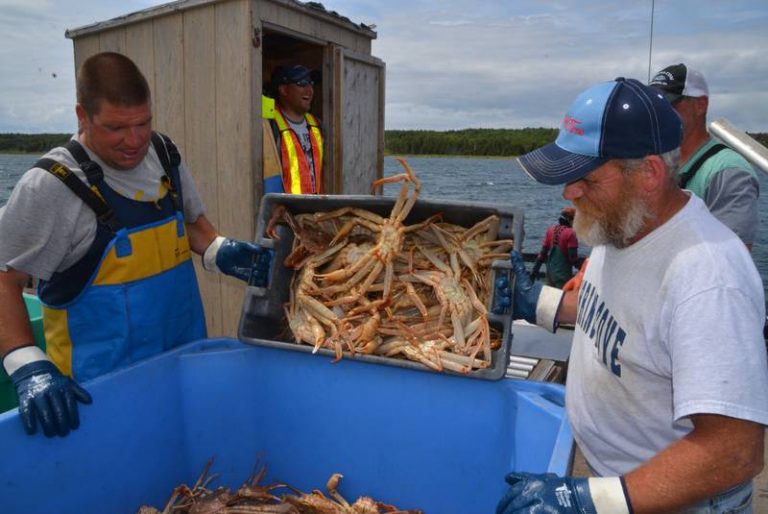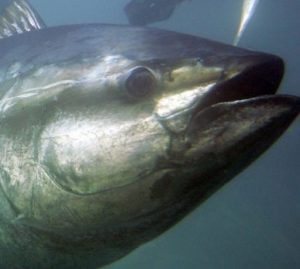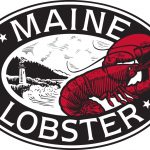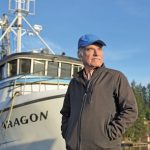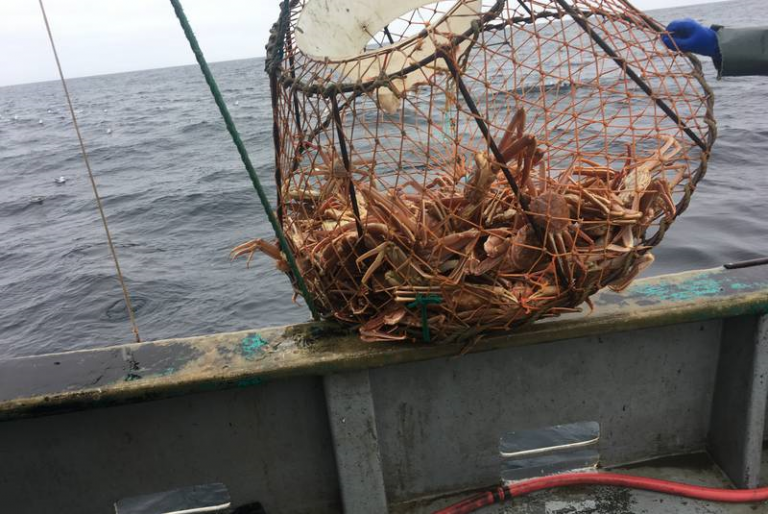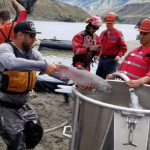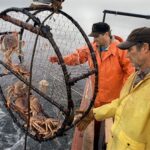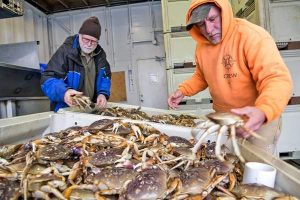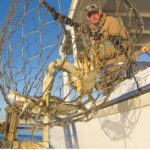Tag Archives: gulf-of-maine-cod
New England panel approves 2013 cod limits with 77 percent cut
The New England Fishery Management Council voted Wednesday night to cut the Gulf of Maine cod fishery limits by 77 percent for the 2013 fishing cycle and to extend similar cuts for the 2014 and 2015, dealing a dire blow to the region’s fishing industry. Why this should be so became a sub-theme of the day, with the phrase “regime shift” used frequently to suggest a braid of environmental and ecological alterations —including millions of lobster traps that take an unknown quantity of cod as by-catch, large volumes of herring which eat cod eggs and seals which feed on cod, as well as the various forms of global warming that emanate from and absorb into the seas. Read more
Crippling ‘reality’ arrives for New England fishermen
The few fishermen who still ply New England’s waters for cod, haddock and other groundfish are bracing for a double dose of bad news this week…..as expected, slash already reduced catch limits by another 70 percent to 80 percent to protect fish populations that scientists now say are much smaller than previously thought….”If the collective goal is to rebuild stocks … then if we don’t start looking at the causes of the problem, we are not going to find a solution.”…..”I don’t know why we should believe the science when three years ago they said the stocks were rebuilding,” Read more
A Must Read – Common-sense fisheries oversight needed By Daniel Goethel. “Extinction”
As the debate looms over whether Gulf of Maine cod catch limits for 2013 and beyond should be cut by 90 percent or a mere 80 percent, I found myself drawn to a piece of writing that I submitted as part of my college applicatio n in 2002. Dramatically enough, it was titled “Extinction” and recapped my naive first 18 years of life as part of a small-boat New England fishing family. The essay started ominously enough by stating that “every year, New England’s fleet shrinks and approaches extinction.” Typically enough, for a pro-fisherman piece, it bashed government science for using incorrect data and ignoring fishermen’s observations, while bemoaning the days of 30-pound trip limits. However, it ended on a cautiously optimistic note highlighting the then-recent increase in cod trip limits to 400 pounds a day.
n in 2002. Dramatically enough, it was titled “Extinction” and recapped my naive first 18 years of life as part of a small-boat New England fishing family. The essay started ominously enough by stating that “every year, New England’s fleet shrinks and approaches extinction.” Typically enough, for a pro-fisherman piece, it bashed government science for using incorrect data and ignoring fishermen’s observations, while bemoaning the days of 30-pound trip limits. However, it ended on a cautiously optimistic note highlighting the then-recent increase in cod trip limits to 400 pounds a day.
Looking back at this work, written more than a decade ago, I am dumbfounded to see that New England groundfish management has once again regressed. Today, I am deep into my pursuit of a PhD in fisheries stock assessment,,,,,,,,Read the rest
Closed Areas need fed’s OK to open
 The New England Fishery Management Council has voted to recommend giving commercial groundfishermen access to parts of five areas that have been closed to them for many years. The request to open closed areas to commercial fishing came days before the NOAA Science Center issued a report on the 2011 fishing year that contained the revelation that only 41 percent of allocated fish were landed in 2011. Read More
The New England Fishery Management Council has voted to recommend giving commercial groundfishermen access to parts of five areas that have been closed to them for many years. The request to open closed areas to commercial fishing came days before the NOAA Science Center issued a report on the 2011 fishing year that contained the revelation that only 41 percent of allocated fish were landed in 2011. Read More
NOAA N.E. chief eyes delay on limits
The New England Fishery Management Council approved the proposal from the Gloucester-based coalition at its special meeting Wednesday in Wakefield. The move came in conjunction with a decision to defer setting catch limits for the groundfishery until the regularly scheduled January meeting – a time frae tha would benefit from a benchmark Gulf of Maine stock assessment and the vetting of it by the council’s Science and Statistical Committee. The coalition wrote last Monday to the council laying out a legal theory derived from an interpretation of the Magnuson-Stevens Act by NOAA last year that became the basis of a one-year interim emergency action on inshore cod that kept the reduction in landings to 22 percent. Read more
U.S. Reopens Waters Off New England for Fishing – NYT
Jud Crawford, the science and policy manager for the Pew Environment Group’s Northeast Fisheries program, said the decision to reopen protected waters could have dire consequences. “One of the concerns is that we will very quickly lose some very important breeding stock in these places,” Mr. Crawford said. The council’s vote is subject to approval by the National Oceanic and Atmospheric Administration’s Fisheries Program, which is expected to act by May. Read More
Fish panel holds off on limit cuts – “I say if you’re going to take 1 damn percent (more), shut the whole God damn thing down!”
 New England fishing regulators Thursday delayed voting on a series of significant cuts to fishermen’s 2013 allowable catch in groundfishing stocks after repeated and emotional warnings that the reductions would finish off an industry already grappling with a federally recognized economic “disaster.” The New England Fishery Management Council voted 15-2 to put off deciding on new catch limits for various bottom-dwelling groundfish species until their next meeting, scheduled for the end of January. Read More
New England fishing regulators Thursday delayed voting on a series of significant cuts to fishermen’s 2013 allowable catch in groundfishing stocks after repeated and emotional warnings that the reductions would finish off an industry already grappling with a federally recognized economic “disaster.” The New England Fishery Management Council voted 15-2 to put off deciding on new catch limits for various bottom-dwelling groundfish species until their next meeting, scheduled for the end of January. Read More
Your View: Fishery council must reject unreliable assessments – By Richard Canastra – southcoasttoday
I nearly always attend New England Fishery Management Council meetings in person, but last month, I was unable to attend the meeting in Newport, and instead listened to the proceedings online. I found that listening, and not physically being there, gives you a different perspective on a meeting. You hear more intently. There are fewer distractions. Examples seem clearer. Patterns emerge. There are some predictable patterns in life. When there is an accident, at the end of the traffic jam you find a police officer. When you go to a restaurant, at the end of dinner the bill comes. And when you attend a fisheries management council meeting that is dealing with a crisis, there is usually a bad stock assessment.
Bad stock assessments have become as predictable as the sunrise. Read More
Share and Share Alike
As a citizen advocate of the fishing industry, I have no confidence in NOAA stock assessments.
I spend a lot of time reviewing material, attempting to convey the results to as many people possible.
These listening sessions allow, as Mr Canastra stated, patterns to emerge.
The patter of Bill Karp, and Sam Rauch deviates not from the typical bureaucratic structure, much to my disappointment after listening to them from various venues, and reading a lot of information.
The revelations of the Georges Bank Yellowtail Flounder Working Group Meeting May 23, 2012, are the foundation of my opinion to condemn the stock assessments as a tool for fishery management, while enforcing Mr Canastras belief that the proper equipment is not being utilized to sample yellow tail flounder abundance.
As stated, patterns have emerged. The pattern of over looking details that have detrimental affects on stock assessments and confidence in them.
At the The New England Fishery Management Council’s three-day meeting in Plymouth Ma on 9/25/2012, a major detail confirmed the retrospective patter of no confidence in stock assessments conducted by NOAA.
During the 54th Stock Assessment Workshop (SAW)/Stock Assessment Review Committee (SARC) Meetings, a fisherman asked a question that received a hollow shrug of the shoulders answer that I find alarming, and telling that these assessments are substandard and incomplete.
The question was, “why is there no mention of herring as a predator species” in the ground fish assessment?
The answer. ” The SSC was, ah, not presented, ah, ah herring as a, ah, predator species….”
Yes. A Retrospective Pattern of the science used to mismanage this industry is established.
No confidence.
NOAA region chief Bullard hedges on interim limits
The coalition theory was based on an interpretation of the Magnuson-Stevens Act for building a second year of relief — “reducing” rather than “ending” overfishing — while a plan to bring the stock to maximum sustainable yield is crafted.,“I’m not going to opine on whether you can squeeze another year out of (the Magnuson regulations),” Bullard said in a Thursday interview at the Times. “We’re willing to take a look at this at the meeting.” Read More
Rep. Antonio F.D. Cabral-Fishing industry needs research money as well as disaster relief
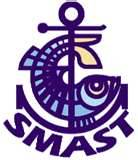 The elections may be over, but the current Congress still has work to do…..We need reliable, independent science. And Massachusetts is best equipped to provide it….That’s because there has not been adequate, sustained funding for independent research centers…..environment using scientific evidence that is, by its own scientists’ admission, often unspecific, unproven and unreliable. NOAA has been put in the position of acting not only as judge and jury, but as prosecution, defense and expert witness…..In particular, the School for Marine Science and Technology (SMAST) at UMass Dartmouth is uniquely suited to provide this research. SMAST has an ideal location as well as a history of fostering positive collaboration between all fishing stakeholders. SMAST can also boast a proven record of success in fishery research. In the 1990s the scallop industry was on the verge of collapse when SMAST pioneered new research on a very tight budget that proved the scallop population wasn’t devastated, http://www.southcoasttoday.com/apps/pbcs.dll/article?AID=/20121118/OPINION/211180303
The elections may be over, but the current Congress still has work to do…..We need reliable, independent science. And Massachusetts is best equipped to provide it….That’s because there has not been adequate, sustained funding for independent research centers…..environment using scientific evidence that is, by its own scientists’ admission, often unspecific, unproven and unreliable. NOAA has been put in the position of acting not only as judge and jury, but as prosecution, defense and expert witness…..In particular, the School for Marine Science and Technology (SMAST) at UMass Dartmouth is uniquely suited to provide this research. SMAST has an ideal location as well as a history of fostering positive collaboration between all fishing stakeholders. SMAST can also boast a proven record of success in fishery research. In the 1990s the scallop industry was on the verge of collapse when SMAST pioneered new research on a very tight budget that proved the scallop population wasn’t devastated, http://www.southcoasttoday.com/apps/pbcs.dll/article?AID=/20121118/OPINION/211180303
“The fishing industry, in general, is in a very negative mood,” The Controversial Science of Counting Fish
At the meeting in Portsmouth on Friday, scientists detailed the complexities and uncertainties of counting fish that live out of sight. They also took questions from fishing industry advocates frustrated over what they say are shifting and incorrect population estimates that have led to lower catch limits and damaged their businesses http://www.seacoastonline.com/articles/20121112-NEWS-211120323
Facing restrictions, fishermen welcome possible disaster aid
Another EDF puff piece from the boring broadsheet! A lot of BS in this one.
South Shore fishermen welcome the prospect of aid from September’s federal disaster declaration, but they remain critical of fishery management practices. Unprecedented competition from large boats over the last year has hurt the mostly smaller boats that populate harbors in Marshfield, Plymouth, and Scituate, they said. The disaster declaration allows, but does not require, Congress to appropriate money. Affected states are asking for $100 million, but the funding is not guaranteed.http://bostonglobe.com/metro/regionals/south/2012/10/17/south-shore-fishermen-welcome-possible-disaster-aid-seek-long-term-solutions/DVHh7P6BvUG4Nhdnb7PPiO/story.html
Cape Cod’s fishermen fret over seals, dogfish and the future
Two areas, 35-miles south and 150-miles east of Chatham have been closed for cod and other groundfish but the National Marine Fisheries Service is contemplating re-opening to help fishermen because all fishermen are facing drastic cuts of 70 percent in cod and 73 percent in haddock on Georges Bank. But not all fishermen are enthused.
Then there’s this insight by someone who can’t be very smart.
Wholesaler Andy Baler of the Nantucket Fish Company noted that huge mid-water trawlers are catching tons of herring off shore while the National Marine Fisheries Service looks idly on. “Cod and haddock feed on local herring but they’re starving. That’s why you see fish so skinny,” he said. “The mid-water trawlers are going to suck every bit of bait out there. You have one management system for some fish and another management system that goes and kills all the fish they eat.” Bullard conceded the two plans are un-connected. NOAA takes a fish by fish approach. “This port is crushed. We’re living on a few dogfish,” Baler declared. “We need some help. Keep the herring here so we can fish the channel.”
Read more: Cape Cod’s fishermen fret over seals, dogfish and the future – – Harwich Oracle http://www.wickedlocal.com/brewster/newsnow/x1826353094/Cape-Cods-fishermen-fret-over-seals-dogfish-and-the-future#ixzz29O2eBrZ9
The relationship is this. The larvae of the bottom fish need to go to the surface of the ocean in order to obtain food – plankton – and light. While they go up, they become a feast for the pelagics. When those larvae that survive become codlThe relationship is this. The larvae of the bottom fish need to go to the surface of the ocean in order to obtain food – plankton – and light. While they go up, they become a feast for the pelagics. When those larvae that survive become codlings, they want to go back to their friends and relatives. While they descend to their native habitat, they become a second feast for the pelagics.
http://carmine3.newsvine.com/_news/2010/11/04/5408211-fish-and-future
Northeast Seafood Coalition issues statement on Accumulation Caps, Fleet Diversity, and “Amendment 18” – savingseafood.org
NSC believes any and all groundfish management measures must be highly sensitive to the potential for unintended consequences to all segments of this fragile fishery.
WASHINGTON (Saving Seafood) October 12, 2012 — On Wednesday, October 10, the Gloucester Daily Times reported that “NOAA’s regional administrator, joined by the Environmental Defense Fund,
the Pew Environment Group, the North Atlantic Marine Alliance and Food & Water Watch, is supporting a belated effort by the federal government to limit the accumulation of catch shares and thus provide
safeguards to smaller independent boats in the Northeast groundfishery…”
Crisis highlights running dispute over US fish law
Jay Lindsey once again tells us a portion of the story, and shame on Peter Baker for capitalizing on it, as is the usual for Peter Baker!
But Peter Baker of the Pew Environment Group said the law is not to blame for fish populations that have dwindled over decades, exactly what the law can fix. The law is pointed in the right direction, he said.
Have the stocks dwindled Peter Baker? And what would you base that assumption upon? The reliable trawl data of the NESC? You have the information that everyone else has that pays attention to these issue. Of course, you wouldn’t recognize the weaknesses when they conveniently favor your ENGO crusade. If there actually is plausibility to the data, and I say that with doubt, would you also recognize that herring would be included as a predator, along with an exploding population of seals, dogfish and skates, hindering any recovery? No you would not! I base that on your narrow-minded herring campaign which can’t seem to be capable of connecting any dots! Isn’t it convenient to say the 2008 trawl data was flawed, while the revelations of the NESC that they are not using the industry designed equipment for the trawl survey as was specified during the creation of it?
I am disappointed with another Jay Lindsey half story again, and am disgusted with the Pew network.
httphttp://www.berkshireeagle.com/northeastnews/ci_21717557/crisis-highlights-fish-law-dispute
Despite possible $100 million in aid, tough regs mean …Fishermen trying to stay afloat
Gloucester fisherman Paul Vitale’s job is on the line.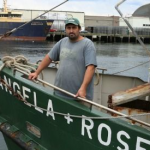
New England legislators are lobbying for $100 million to save next year’s groundfish fishery season in the wake of a disaster declaration, but that isn’t easing Vitale’s uncertainty about his industry’s future.
“There’s three households earning money off of my shoulders,” said Vitale, 40, captain of the 50-foot “Angela + Rose” and a father of three. “We never know day to day what’s happening.”
http://www.bostonherald.com/news/regional/view.bg?articleid=1061162384






 SEAFOOD.COM NEWS by John Sackton (Editorial Comment) – June 15, 2011 A
SEAFOOD.COM NEWS by John Sackton (Editorial Comment) – June 15, 2011 A






























